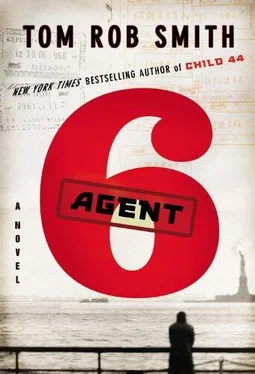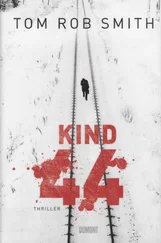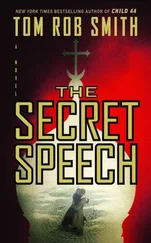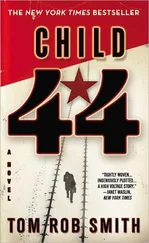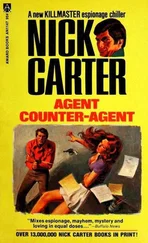Tom Smith - Agent 6
Здесь есть возможность читать онлайн «Tom Smith - Agent 6» весь текст электронной книги совершенно бесплатно (целиком полную версию без сокращений). В некоторых случаях можно слушать аудио, скачать через торрент в формате fb2 и присутствует краткое содержание. Жанр: Триллер, на английском языке. Описание произведения, (предисловие) а так же отзывы посетителей доступны на портале библиотеки ЛибКат.
- Название:Agent 6
- Автор:
- Жанр:
- Год:неизвестен
- ISBN:нет данных
- Рейтинг книги:4 / 5. Голосов: 1
-
Избранное:Добавить в избранное
- Отзывы:
-
Ваша оценка:
- 80
- 1
- 2
- 3
- 4
- 5
Agent 6: краткое содержание, описание и аннотация
Предлагаем к чтению аннотацию, описание, краткое содержание или предисловие (зависит от того, что написал сам автор книги «Agent 6»). Если вы не нашли необходимую информацию о книге — напишите в комментариях, мы постараемся отыскать её.
Agent 6 — читать онлайн бесплатно полную книгу (весь текст) целиком
Ниже представлен текст книги, разбитый по страницам. Система сохранения места последней прочитанной страницы, позволяет с удобством читать онлайн бесплатно книгу «Agent 6», без необходимости каждый раз заново искать на чём Вы остановились. Поставьте закладку, и сможете в любой момент перейти на страницу, на которой закончили чтение.
Интервал:
Закладка:
– Her parents have been picked up and taken into custody. I want her to question them. I’d like you to help.
Leo was being asked to act as an interrogator. Nara said again, her Russian improving with the practice:
– My parents?
Greater Province of Kabul 8 Kilometres East of the City of Kabul
Unaccustomed to using an army vehicle, or any vehicle other than a bicycle, Leo drove slowly. The allocation of a Soviet UAZ-469, a Russian version of the American Jeep with bulletproof windows and reinforced-armour sides, was an attempt to ensure their safety. There were distress flares in the back, spare gasoline, a first-aid kit, water, dry rations, guns and ammunition. Even so, he much preferred his bicycle as a way of getting around. The dust trails launched up from the back tyres of the jeep formed a plume of sand that rose for at least twenty metres, signalling the vehicle’s presence to the entire valley. Captain Vashchenko had insisted that they take the UAZ-469, not understanding that driving a conspicuously Soviet vehicle made it far more likely that someone would shoot at you. The belief in technology as a solution to the dangers of the insurgency was flawed. The armour and bulletproof glass might protect Leo and Nara today but in a few months the enemy would improvise new methods of destruction. The Soviet response would be to increase the vehicle’s defences, to reinforce the doors and clad the undercarriage. But it was always easier to destroy something than to protect it and that was ultimately why Leo was sure the edifice of this occupation would fail: there was too much to protect, with too many people seeking to destroy it. No matter how many troops were sent, or how much money was spent, the imbalance would remain.
Seated next to him, Nara had hardly spoken since being given the orders to interrogate her parents. Shortly after daybreak, her mother and father had been extracted from their home village, a Spetsnaz team securing the area, pulling them from their house and bundling them onto the helicopter. Hearing this, Nara had asked if they’d been injured, concerned for their welfare, convinced that they were innocent of the allegations. In her mind she was heading to the prison with one agenda: to arrange their release.
Leo preferred to travel in silence; however, in this silence he could hear Nara’s thoughts as clear as if she were speaking aloud: her attempts to argue the evidence and to defend her parents’ behaviour. They love me.
They would never hurt me.
They’re peaceful people.
They’re good people.
I’m their daughter.
Puzzling over how best to prove their innocence, busy constructing explanations as to why her parents happened to be away when the attack took place, Nara finally couldn’t resist testing her arguments on him.
– My father has built more of Kabul than any other man alive. He is a creator, a visionary, not a terrorist. He might be old fashioned. Most men are. I might have disappointed him in some respects. That does not make him a murderer.
Leo took his eyes off the road, regarding this beautiful young woman with her large pale-green eyes. Quite unlike Raisa, she was naive and earnest – it was impossible to imagine Raisa ever being so gullible. Raisa was a survivor and the shrewdest woman Leo had ever known. He was unsure if Nara Mir wanted him to contradict her. Without answering, Leo turned back to the dirt road. Though the swirls of dust, coming into view directly ahead, was the outline of Pul-i-Charki prison.
Though the plans and design for the prison predated the Communist Revolution, the completion of the flity coincidentally corresponded with the arrival of the Revolution, creating the impression that one could not exist without the other: an infamous political prison required a revolution as much as a revolution required an infamous political prison. Remarkably, this was Leo’s first time here. He’d avoided Pul-i-Charki, declining any assignments connected with it. There was no need for him to go inside to know what kind of place it was. Conditions would be inhumane. Degradation and humiliation would be institutionalized. Under the reign of the former president, guards preferred broken soda bottles as a torture instrument of choice, displaying an inexplicable loyalty for an American soda brand that could be bought in Kabul, a type of fizzy, orange-flavoured sugar water called Fanta. There were the more familiar methods, some lifted directly from the Soviet model, including electrodes, bare knuckles and truncheons. Savagery had its cliches too.
The familiarity was not limited to the instruments of terror but extended to the lines spoken by its lead players. Aarif Abdullah, one of the former guards in charge of Pul-i-Charki, had boasted to Leo: A million Afghans are all that should remain alive – a million Communists, and the rest, we do not need. We’ll get rid of all of them.
This indifference to human life, this absurd and chilling pomposity, could have been the anthem of authoritarianism. These grandiose proclamations were made by men drunk on the power of life and death, unaware that they were behaving more or less exactly the same as the Soviet guards and prison governors who’d lived thirty or forty years before them, thousands of miles away, surrounded by snow and ice, rather than dust and desert. Despite their supreme power they expressed no trace of individuality or personality, as if power possessed their minds and made puppets of them, these would-be gods.
As Leo came to a stop, Nara became even more flustered, her hands fidgeting. She opened the glove compartment. There was a pistol and a clip of ammunition. She shut the glove compartment. Briefly, Leo wondered if she was going to be sick. She looked at Leo, utterly lost.
– But I’m their daughter.
Leo took out his sunglasses, glancing at the dirt on the lens and not bothering to clean them. They’d arrived.
Greater Province of Kabul 10 Kilometres East of the City of Kabul Pul-i-Charkhi Prison
Like a sprawling desert fortress, the prison was surrounded by yellow-brick outer walls, three times the height of a man, running unevenly across the terrain, linking squat guard towers with pyramidal roofs. Rake-thin guards in ill-fitting uniforms slouched in the shadows, antique rifles slung over their shoulders. The scene would not have looked out of place in an American Western, the frontier outpost, housing gunpowder, whiskey and stables. Leo regarded the institution through the smudged lens of his aviator sunglasses, his eyes drawn less to the building itself and more to the vast space around the prison. It was in the middle of nowhere, rising from an arid plain; there was no clue for its existence: a fortress with nothing to protect, no river, or valley, no crops or people, as if it had been built thousands of years ago, surviving s away, the reason for its construction was eroded by the sand. There was no doubting the symbolism of this far-flung place: geographically and morally beyond the reach of civilization, a world of its own. Leo had heard talk of fifteen thousand people being executed here but he was numb to these statistics, numb to notoriety. Over the course of his life he’d heard so many numbers about so many different prisons, seen so many lists, heard so many whispered atrocities. Whatever the true number might be, it was certain that not one of those men or women had received proper burials, their bodies tossed into shallow graves outside the walls. Perhaps that’s why they’d designed the prison to look like a fortress, to guard over the angry souls trapped in the sand. It was a fanciful idea and one Leo might have taken more seriously if he had ever believed in life after death.
Читать дальшеИнтервал:
Закладка:
Похожие книги на «Agent 6»
Представляем Вашему вниманию похожие книги на «Agent 6» списком для выбора. Мы отобрали схожую по названию и смыслу литературу в надежде предоставить читателям больше вариантов отыскать новые, интересные, ещё непрочитанные произведения.
Обсуждение, отзывы о книге «Agent 6» и просто собственные мнения читателей. Оставьте ваши комментарии, напишите, что Вы думаете о произведении, его смысле или главных героях. Укажите что конкретно понравилось, а что нет, и почему Вы так считаете.
